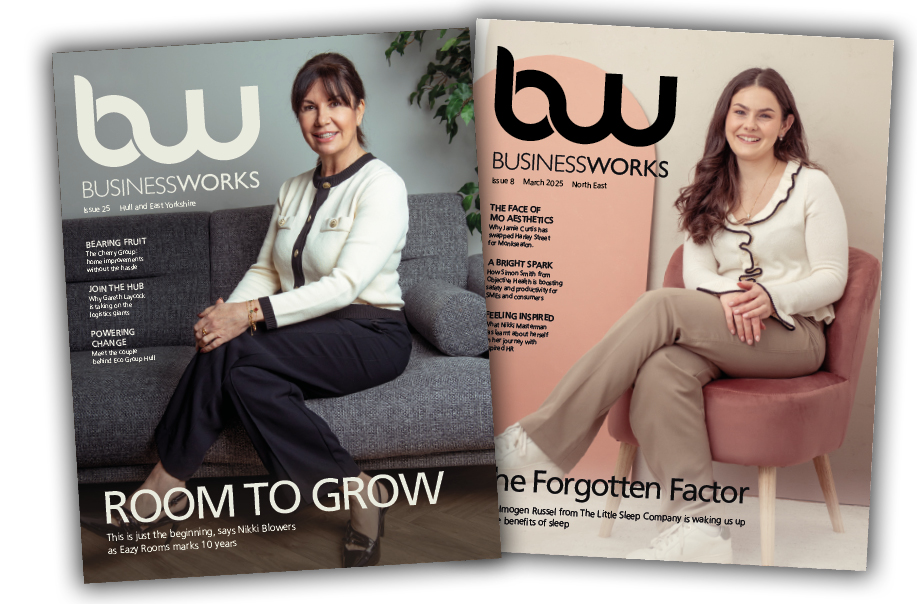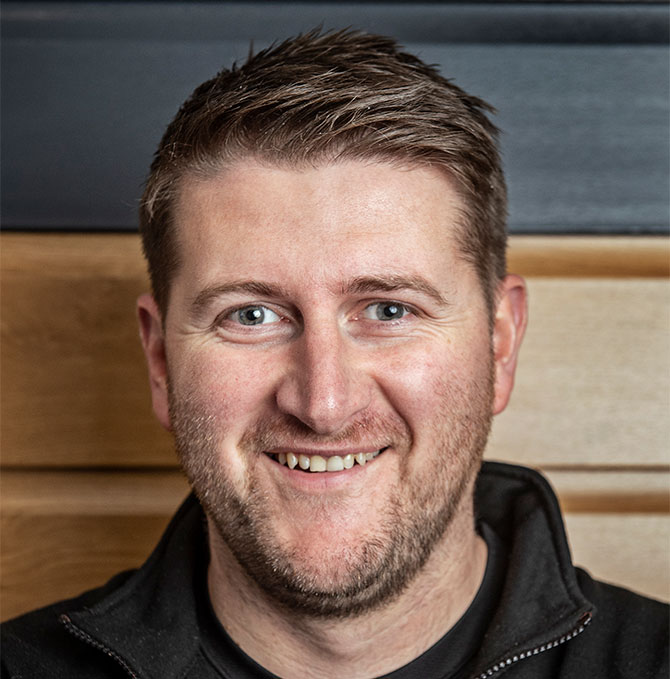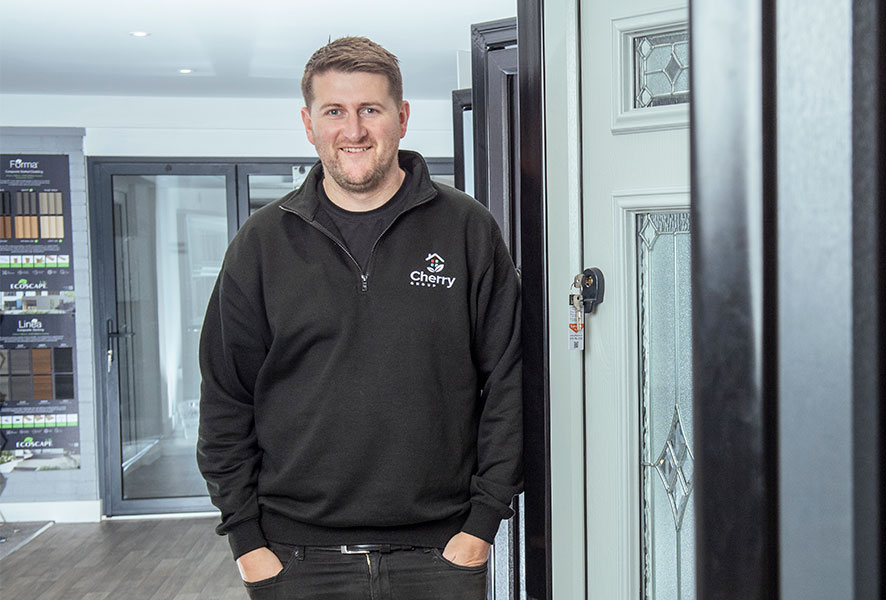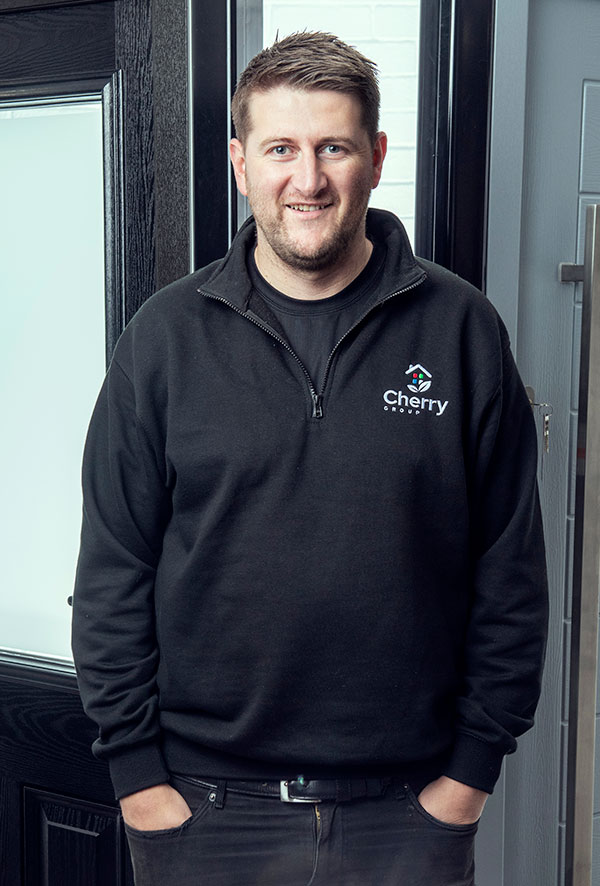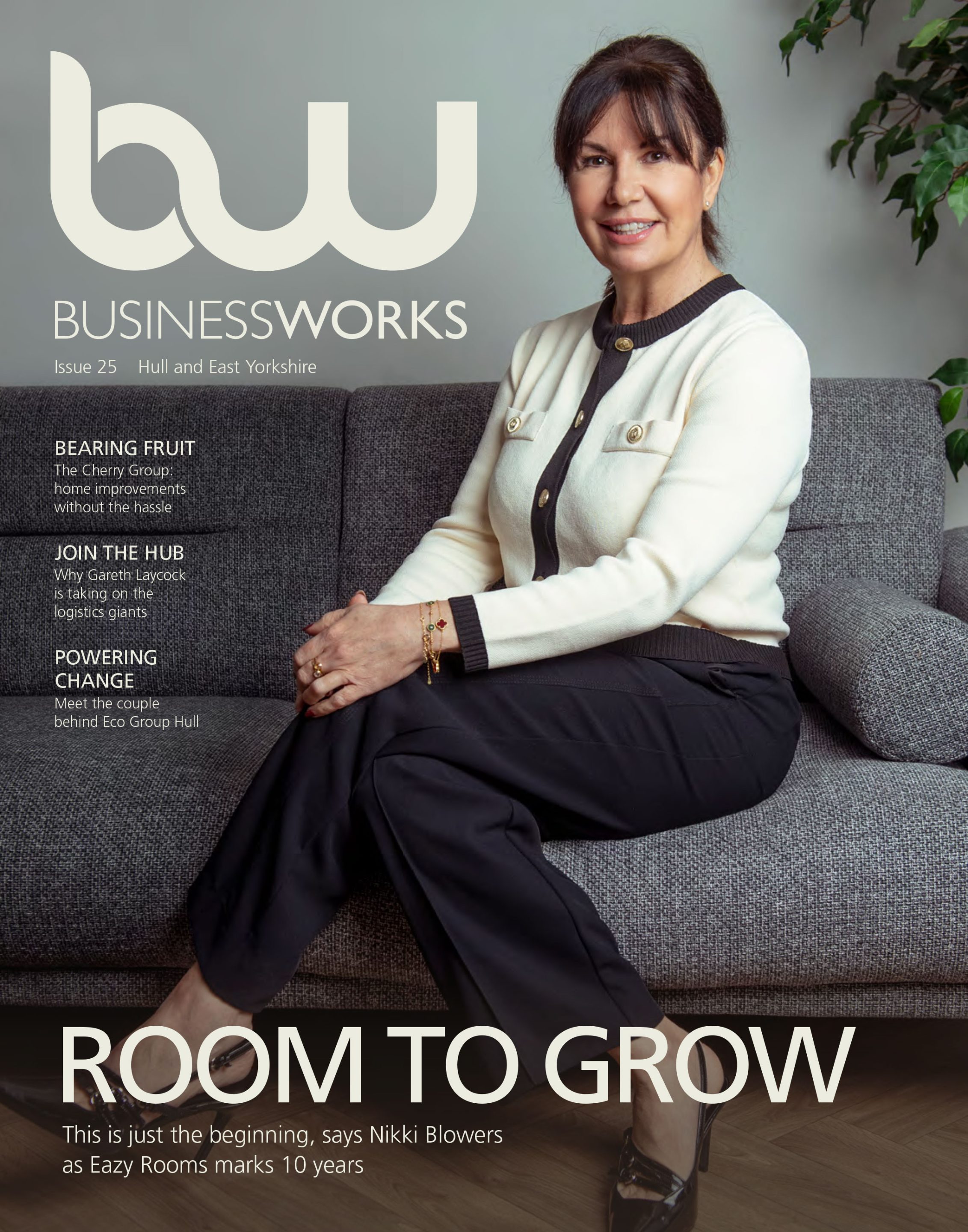Sam Hawcroft talks to Chris Wilson, co-founder of growing Beverley-based home improvements firm the Cherry Group
When Chris Wilson left his stable job as an emergency planning officer within the council, he wasn’t chasing a grand vision of corporate dominance or a meticulously crafted business plan.
In fact, his leap into entrepreneurship was sparked by a simple conversation with a friend, Stew, a locksmith by trade, who suggested he was “wasted” in the public sector. That offhand remark would become the first step in an unexpected yet remarkable business journey, culminating in the creation of Cherry Group.
Chris’s background couldn’t have been further from the world of windows, doors and conservatories. Having spent 14 years working in contingency planning, he was used to organising emergency responses, liaising with public services and navigating the bureaucratic intricacies of government operations. It was a secure job, but when he found himself stuck in a career with little room for progression and a pay cut following a colleague’s return from maternity leave, the frustration set in.
“It was a good job, and I enjoyed it, but I needed to do something different,” says Chris. “Mid-30s, sitting in a room with people earning six figures while I was doing a lot of work for much less – it just didn’t sit right with me.”
That’s when Stew approached him with an opportunity. During the Covid-19 pandemic, Stew’s locksmith business had slowed, prompting him to explore window and door maintenance as an additional revenue stream. Recognising Chris’s organisational skills from his work as well as his time managing football teams and handling grant applications, Stew asked him to oversee the administrative side of the fledgling operation. The timing wasn’t exactly ideal – Chris had a three-month-old baby at home – but sometimes, the biggest risks lead to the greatest rewards.
Starting a business during a global pandemic isn’t for the faint-hearted. With no prior experience in the private sector, let alone in the home improvement industry, Chris relied heavily on transferable skills from his council days: planning, scheduling and managing operations. The early days were challenging.
“It was really slow going at first,” he says. “It was just me and Stew with a few subcontractors. We were winging it, trying to get our feet under the table.”
But they weren’t winging the installations. Their commitment to quality work, combined with Chris’s knack for organisation and Stew’s technical expertise, began to attract clients. They diversified quickly – expanding from windows and doors to conservatory warm roofs, modular extensions and even acquiring a locksmith business to strengthen their offerings. Recognising the need for a cohesive brand, they rebranded as Cherry Group – with their three distinct divisions being the symbolic three “cherries” on the stalk: windows and doors, eco-rooms and locksmiths.
One of the most striking things about Cherry Group is its deliberate departure from the traditional double-glazing sales model. “I never wanted to be the typical double-glazing salesman,” Chris says. “You know the type – turn up, sit in someone’s house for three hours, quote a ridiculous price, and then magically knock off £5,000 if they sign today. People hate that.”
Instead, Cherry Group operates on transparency and honesty. Quotes are provided quickly and fairly, without high-pressure tactics or gimmicky sales pitches. This approach has not only resonated with customers but has also become a cornerstone of the company’s growth strategy.
“Our best marketing tool is just being decent people,” Chris adds. “No foot-in-the-door tactics, no phoney discounts – just honest work.”
Chris’s brother Jamie, also a locksmith by trade, has stepped away from the tools to lead the window and door sales side of the business, supporting its expansion while maintaining the company’s ethos of no hard selling and a strong family feel.
What began in Stew’s converted garage, with windows and doors being delivered to his driveway (much to the amusement of the local Facebook groups), has evolved into a thriving business with more than a dozen employees, a showroom and a fleet of company vehicles. The decision to shift from subcontractors to full-time staff was pivotal, marking a significant transition from a small operation to a structured company with defined roles and responsibilities.
“It was a big leap,” Chris says. “Suddenly, you’re responsible for people’s livelihoods. There’s payroll, HR, IT security, contracts – it’s not just about getting the work done any more; it’s about running a business properly.”
This growth hasn’t been without its challenges. Reinvesting profits back into the business, managing cash flow and navigating the complexities of employment law have all been part of the learning curve. Yet, despite the pressures, Chris and Stew have maintained the culture that set Cherry Group apart in the first place: a focus on people, both employees and customers.
“Finding the right people is always a challenge,” Chris says. “We’re in an era where people ask what a job can do for them before they ask what they can bring to the role. That’s been a huge shift. You need to find those who genuinely care about what they do.”
Cherry Group’s success is also rooted in strategic partnerships. Their collaboration with Leka Systems, for example, has allowed them to offer cutting-edge modular extensions and conservatory warm roofs – solutions that address common issues such as poor insulation and unusable seasonal spaces. These modular builds can be installed in a matter of days, offering clients cost-effective, energy-efficient alternatives to traditional extensions.
“The modular side of the business is where we see the most growth potential,” Chris explains. “People want quick, sustainable solutions without the hassle of months-long construction projects. Plus, with rising energy costs, everyone’s thinking about insulation and efficiency.”
Networking has also played a crucial role. Chris acknowledges that, in the beginning, he underestimated the value of business relationships. “I used to think networking events were a waste of time, but they’ve been invaluable. It’s not just about what you get directly – it’s about helping others and building a reputation. Eventually, it all comes back around.”
While the ambition to grow is strong – especially in the eco-rooms and modular extension market – Chris is clear about what success looks like. “I don’t want to be rich. I just want to live comfortably, go on nice holidays with my family and not have to stress about money. That’s the goal.”
It’s a refreshingly grounded perspective, one that reflects Cherry Group’s ethos: honest work, genuine relationships and a commitment to doing things differently. But growth remains on the horizon. Chris and Stew are keen to expand their footprint in new areas, particularly in Driffield and other parts of East Yorkshire where they see potential.
“We’ve done really well in Beverley – more than half of our jobs are there – but there are other areas where we haven’t tapped into the market as much yet,” Chris says. “We’re looking at strategies to expand, whether it’s through local advertising, networking or partnerships.”
There’s also a focus on the next phase of modular builds. Cherry Group has been in discussions with installers in Manchester and Dundee to create a nationwide network, ensuring their services reach a wider audience while maintaining the high standards they’ve built their reputation on.
As Cherry Group continues to expand, Chris remains mindful of the delicate balance between growth and maintaining the personal touch that defines their business. “When we started, I had contact with every single customer. Now, we’ve got jobs I haven’t even been involved in. That’s weird, but it’s also a sign that we’ve built something sustainable.”
One thing Chris has learned through it all is the importance of loyalty – both to customers and suppliers. “There have been plenty of times when we could have switched suppliers for a slightly cheaper deal, but loyalty goes a long way,” he says. “If you build solid relationships, you get reliability in return. That’s invaluable in this industry.”
From contingency planning meetings to managing modular builds, Chris’s journey is proof that entrepreneurship isn’t about having all the answers from the start. It’s about taking the leap, learning as you go, and staying true to what matters most. Cherry Group may have started as a modest venture between two friends, but with an eye on sustainable growth and a commitment to doing things the right way, the future looks incredibly bright.

